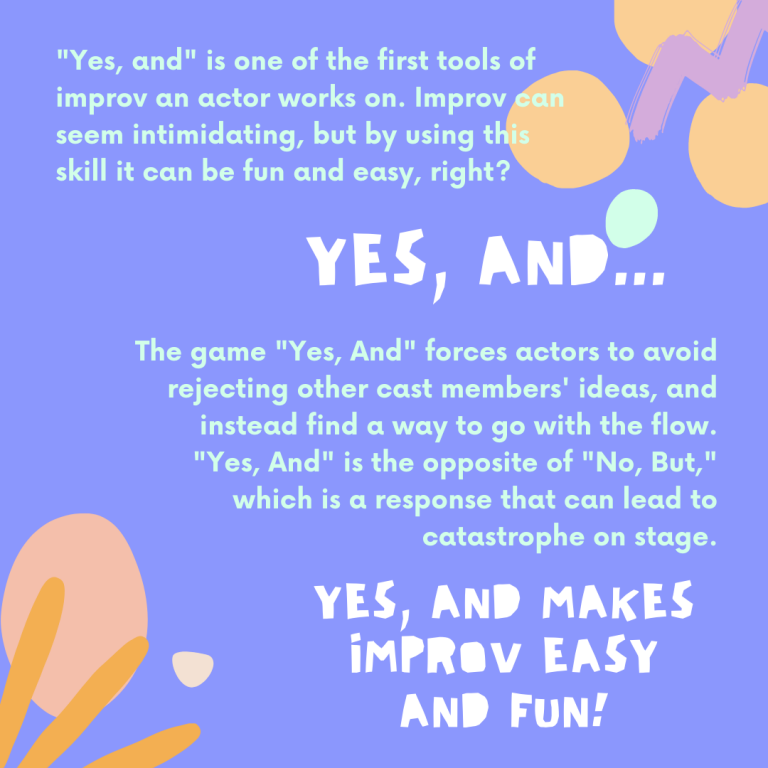Actors of all ages can increase their acting skills, develop confidence, and learn how to make mistakes into wonderful opportunities using Yes And. This simple acting improv game is a true winner for teaching us to work together and open ourselves up to what life and the theater has to offer!
Email or call now to give Yes And a try in our Acting Improv class (ages 7-13) or set up a semi-private lesson with a friend!
The Problems Actors Face in Live Theater When Things Go Wrong
One of the delights of live theater is that anything can happen. During a live performance when an actor forgets their lines, their fellow actors can learn how to jump in, say Yes And to the situation, and save the performance by improvising their way through.
Yes, professional and amateur actors in live theater will eventually face a moment onstage when someone has forgotten a line. Without training in improvisation, actors can be terrified, tongue-tied, and the scene can come to a complete halt. With an understanding of improv and teamwork, actors can save each other and the scene without the audience ever noticing that something went amiss. This is part of the thrill of live theater for both the performers and the audience if they noticed at all!
Not only do lines get missed and then saved, but in live theater there can be all kinds of mishaps with props gone missing, an entrance missed, or a costume piece that can’t be found. Somehow the actors must work together to move the scene forward in a way that still works for the plot.
Acting improv can be a performance skill in its own right, and performers can entertain the audience with the way they jump in and develop one idea into a fully improvised scene.
Why is “Yes, And” Important in Particular?

Yes, And is one of the basic pillars of improv because it provides the most opportunity for creativity and collaboration amongst scene partners! The game itself is very simple. In an improv exercise, actors are required to accept their fellow actors’ ideas and build on them.
By forcing actors to accept and develop each other’s ideas rather than reject them, they are able to support each other, work as a team, and in they process they learn to go with the flow and have fun with improv rather than be intimidated by it. Compare this to Yes, And’s opposite: No, But. By denying their scene partner with “No,” actors are rejecting their partner’s idea and the scene stalls before it is able to build momentum and establish a clear and exciting story. (Yes, But is a fun game that easily follows Yes, And since it’s agreeing to your scene partner’s premise. No can work for more advanced actors as long as they are saying yes to the premise of the scene but their character is saying no.)
Take a look at these examples:
Scene 1:
“It’s so hard being a cowboy with no cows.”
“Yes, and I can’t believe all of the cows would rather hang out with the sheepherder than us.”
“Yes, and I think we should steel the sheep from the sheepherder to get payback.”
Scene 2:
“It’s so hard being a cowboy with no cows.”
“No, but we aren’t even cowboys, so how would we know?”
See the difference? The first scene could theoretically go on forever, with both actors building on the ideas of one another to create an interesting story. In the second exercise, it’s clear that both actors have very different ideas about the direction they want the scene to go but are unwilling to compromise and collaborate. What you’re left with is an uncomfortable situation in which the actors are butting heads and are not able to develop the plot.
Scene 3:
“It’s so hard being a cowboy with no cows.”
“No, it’s not the lack of cows that’s getting to me. It’s hanging around you and your negativity!”
This third scene shows a variation of Yes, And once you’ve gotten the hang of it. You don’t always have to say Yes, And to be saying yes to your partner. You simply have to agree to the situation your partner sets up, and then react by adding more information that will lead the scene and the relationship somewhere interesting. Can you imagine where this scene might go next? If it feels like there is still momentum, then the actors have said yes even when saying no.
Scene 4:
“It’s so hard being a cowboy with no cows.”
“Yes, but at least we don’t have to milk them all day.”
Yes, But is another way to say yes to your acting partner’s situation and then adding something more. It tends to lead towards a discussion about the pros and cons of a situation, so it develops relationship.
Before diving into the variations of Yes, But or the more advanced No, make sure you have fully tried out the fun and simplicity Yes, And!
Now You Try!
Now that you know what Yes, And is and how it’s helpful, find a partner and use these opening line prompts to improv your own scenes! Don’t worry about if the scene is “right” or “wrong,” just focus on communicating and collaborating with the other person.

Once you try out these prompts, have some fun with improv and use the same lines again, this time with the goal of taking the scenes in entirely different directions! The possibilities are endless when it comes to Yes, And games.
We know that a good scene (improv or not) has to have conflict. That’s what makes it interesting! Yes, And scenes are no different. You can absolutely create conflict in your scenes without disagreeing and stopping your scene partner. That allows the scene to grow and develop and explore different ranges of emotions and stakes! Check out this example, continuing the cowboy scene.
“It’s so hard being a cowboy with no cows.”
“Yes, and I can’t believe all of the cows would rather hang out with the sheepherder than us.”
“Yes, and I think we should steel the sheep from the sheepherder to get payback.”
“Yes, and you should be the one to do it because you’re faster than me.”
“Yes, and I think that you’re just scared of the sheepherder so you don’t want to get involved. You want me to take the fall if we get caught!”
“Yes, and that’s just the smart thing to do! I’m the brains of our duo, you’re the brawn.”
Now, the two actors have set up a scene that would allow for oodles of creative improving. Should they explore the tension between them and figure out how to resolve it so they can become friends again? Or do they want to delve into the plan for how they are going to steal the sheep? Or maybe they want to figure out how to make the cows like them again so they can resume their cowboy jobs! The possibilities are endless, and the actors can work together to affect the audience with the scene they create.
And remember, the goal of improv is not to be perfect but to instead work on being present with any scene partners you have and to think quickly on your feet. It should be a fun exercise, not something scary! If you’re feeling nervous, try starting with the silliest situation and lines you can think of. Talk about something that excites you or makes you giggle. Then, as you get more comfortable with thinking on the fly, try doing some improv on a topic that’s more grounded in reality!
Want a little more guidance? Contact us now to try out our online Acting Improv class (for ages 7-13 all levels)! Garden Players teachers can guide you (or a kid you know) how to improvise, think on your feet, trust yourself, work as a team, and grow your acting skills in a safe and supportive environment! Private lessons are also available.
Written by Garden Players instructors Paige Levy & Betina Hershey.
– Betina Hershey runs Garden Players classes, teaches private lessons, songwriting, acting improv, musical theater techniques, audition preparation, writes musicals that have been published and performed in over 65 countries around the world, and has performed in musicals and bands worldwide. Her students go on to attend La Guardia H.S., Frank Sinatra, Talent Unlimited, Professional Performing Arts School, and more.
Contact Betina to schedule a consultation or private coaching now or sign up for classes at the link below.
Subscribe to our newsletter for theater inspiration and Garden Players news.
Sign Up for Winter/Spring 2021 Semester

